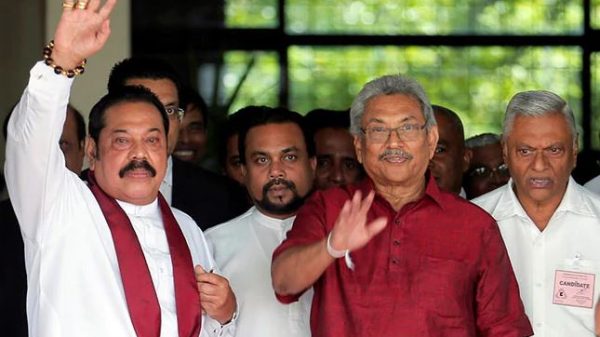Rajapaksas eye comeback in tense Sri Lanka election

- Update Time : Saturday, November 16, 2019
- 237 Time View

Sri Lankans voted Saturday for a new president in what could mark a comeback for the Rajapaksa clan, lauded by supporters for crushing the Tamil Tigers but condemned by critics for war crimes, corruption and cosying up to China.
Despite tight security in an island that emerged from civil war only a decade ago and in April suffered Islamist extremist bombings, gunmen attacked a convoy of 100 buses transporting minority Muslim voters, police said.
There were no immediate reports of any casualties in the attack in the northwest of the Indian Ocean island.
The electoral contest sees Gotabaya Rajapaksa, 70, running for the top job almost five years after his brother, political heavyweight Mahinda Rajapaksa, lost power.
He is promising development and security in the wake of the April attacks that killed 269 people.
His main opponent is Sajith Premadasa, 52, from the governing liberal United National Party (UNP), son of assassinated former president Ranasinghe Premadasa, who is also pushing security and development as well as free sanitary pads for poor women.
Some 85,000 police were on duty to ensure the smooth running of the polls, election officials said.
The incident in northwest Sri Lanka saw the attackers pelt buses with stones, burn tyres on the road and set up roadblocks later cleared by police.
In the Tamil-dominated northern peninsula of Jaffna, meanwhile, police and troops were locked in a tense standoff where residents complained of military roadblocks ahead of voting.
Sri Lanka’s minority Tamils and Muslims are seen as crucial to deciding a winner in the close contest.
Just under 16 million people are eligible to vote, with a record 35 candidates, including two Buddhist monks but just one woman, on the monster ballot paper. Results could be known as early as midday (0630 GMT) on Sunday.
Before voting began, people were seen queueing up outside schools and public buildings housing the 12,600 polling stations, which are due to close at 1130 GMT.
‘Death squads’
The Rajapaksas are adored by Sri Lanka’s Sinhalese majority for defeating the Tigers and ending a 37-year civil war on the Indian Ocean island in 2009 in which around 100,000 people lost their lives.
For the same reason, the brothers are detested and feared by many in the Tamil minority, who make up 15 percent of the population. The conflict ended with some 40,000 Tamil civilians allegedly killed by the army.
During Mahinda Rajapaksa’s presidency from 2005-15, Gotabaya was defence secretary and effectively ran the security forces, even allegedly overseeing “death squads” that bundled political rivals, journalists and others into white vans. Some were never seen again.
The grey-haired retired army lieutenant colonel, dubbed the “Terminator” by his own family, denies the allegations.
“If Mr. Gotabaya Rajapaksa returns, the white van culture will return,” Alfonso, a half-Tamil man in Colombo, told AFP. “Nobody can speak against him. Nobody, not just us.”
Many Muslims in the Buddhist-majority country of 21.6 million are also worried, having already witnessed increased hostility since the April attacks, including hundreds of homes and shops being trashed.
What also concerns Western countries, as well as India, is that strategically located Sri Lanka moved closer to China under Mahinda, even allowing two Chinese submarines to dock in Colombo in 2014.
Beijing loaned and granted Sri Lanka billions of dollars for infrastructure projects under China’s immense Belt and Road Initiative spanning Asia and beyond. Mahinda says credit was unavailable elsewhere.
Sri Lanka was forced in 2017 to hand Beijing a 99-year lease on the port of Hambantota after being unable to service a $1.4-billion Chinese loan, highlighting for critics the debt dangers of Beijing’s scheme.
“Chinese entities were also credibly accused of fuelling corruption, illegally funnelling money to favoured political candidates, and inserting sovereignty-violating provisions into their infrastructure agreements,” said Jeff Smith, a research fellow at US think-tank the Heritage Foundation.
Western capitals “should give a fair chance to us,” Basil Rajapaksa, another brother, told reporters. “They can’t be monitors of this country. They must be partners.”















